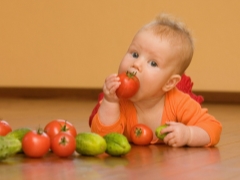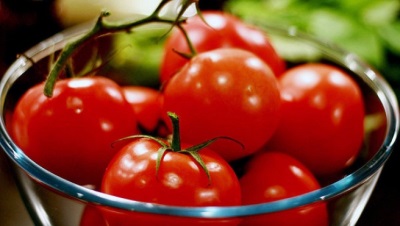At what age can you give a child tomatoes?
Vegetable lure is one of the most important for the child's first years of life, as it gives the crumbs valuable vitamins, fiber, trace elements and other useful substances. One of the favorite vegetables in both adults and children are tomatoes. But their bright coloring causes concern, so before introducing such a tasty and healthy vegetable into the children's menu, parents should learn more about its effect on the children's body and the optimal time for children to get acquainted with tomatoes in different forms.
Benefit
- Tomatoes are rich in vitamins B1, PP, K, A, B2, beta carotene, potassium, iodine, copper, iron, calcium, zinc, and many other valuable compounds.
- As part of the tomato substance is lycopene, a beneficial effect on the cardiovascular system. It can also prevent cancer. It is important to know that its absorption improves with the heat treatment of tomatoes.
- Organic tomatoes, phytoncides and pectin are found in ripe tomatoes. They are useful for the digestive tract and the excretory system.
- Tomato is considered a good antioxidant. It also has antibacterial and anti-inflammatory properties.
- The use of tomatoes thins blood, accelerates metabolic processes, calms the nervous system.
- Tomatoes are good as a snack because they can stimulate appetite.
You can learn more about the beneficial properties of tomatoes by watching the program “Live Healthy”.
Minuses
- An allergic reaction to tomatoes often occurs.
- Tomatoes are contraindicated in diseases of the digestive system, as well as kidney disease.
- In greenhouse tomatoes, there may be too many chemicals that can cause child poisoning.
- Excessive consumption of tomatoes threatens problems with the work of the digestive tract.
From how many months can you put in feed?
Thermally processed tomato can be entered into a children's diet from 10 months of age.
Fresh tomatoes should not be given to children younger than a year.
In what form to give?
You can introduce a child of the first year with tomatoes in the form of tomato juice or tomato puree.
The best choice would be the finished product from a trusted manufacturer of baby food. The first portion should be no more than 1/2 teaspoon of the product, and with normal tolerance it can be gradually increased.
Crowns older than a year are offered raw tomatoes, peeled (for cleaning, the vegetables must be scalded with boiling water).
For one-year-old babies, tomatoes are ground into mashed potatoes, and for kids older than 1.5-2 years old, who are already learned to chew, they can be added to salads and snacks. At the same time, it is recommended to fill the dishes with vegetable oil, as it improves the absorption of lycopene. If a child has digestive problems, tomatoes and cucumbers are not recommended to combine in salads.
Dishes with tomatoes for children over 3 years old become more diverse - they are baked with other vegetables, cheese or meat, added to soups, various salads and pies. Do not combine tomatoes with dairy products.
Should I give salted or pickled tomatoes?
Canned and pickled tomatoes contain ingredients that harm children's bodies (vinegar, salt, spicy seasonings), therefore, they are not recommended for baby food until 3 years of age, and for babies from 4 to 7 years old, the daily portion of such products should be limited.
If a child has problems with the kidneys, blood pressure and heart, tomatoes in salt or pickled form are contraindicated for them in general.
Tips for choosing
For baby food, it is best to use ground tomatoes, as there are more chemicals in greenhouse vegetables. Buy intact ripe vegetables with a uniform color, no dark spots or rotten patches.
What to do if you are allergic?
If a child who has tried a tomato for the first time or for several days has an allergic reaction in the form of a rash, digestive disorders, rhinitis, dry cough, redness on the skin or other signs, the product is necessarily canceled.
When symptoms are expressed, you should consult your doctor so that he prescribes a suitable treatment, and repeated testing of the introduction of tomatoes into the diet is recommended at a later age.





























































